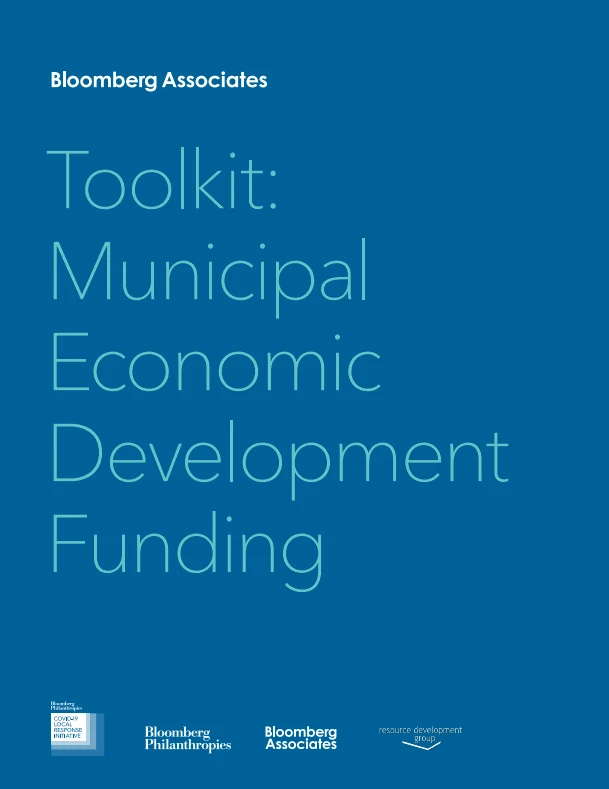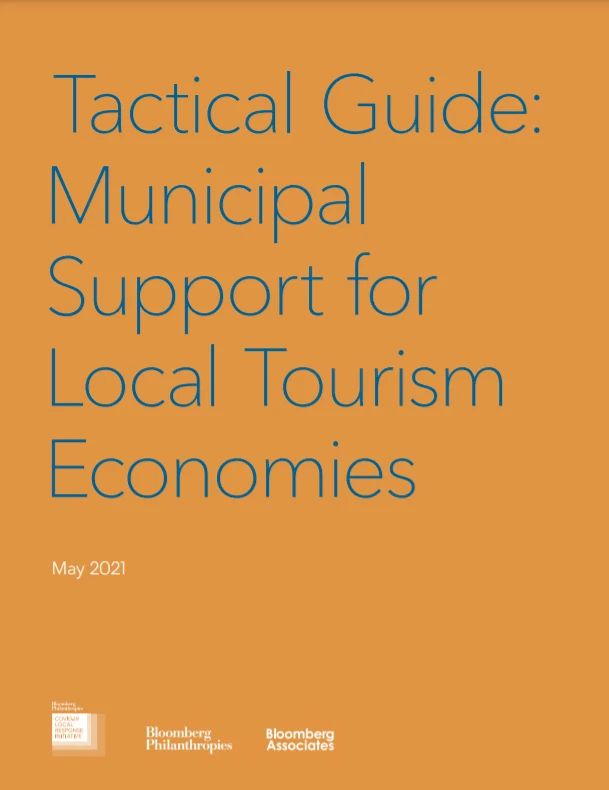COVID-19 Economic Response and Recovery
Integrate Programs to Achieve Better Delivery and Cost Savings
Action:
Cities should explore opportunities to integrate complementary departments, agencies, and/or programs, such as economic development, workforce development, community development (planning, building, zoning), neighborhood development, housing, equity/economic mobility, tourism/ convention attraction, and finance authorities.
Why:
Department, agency, and/or program integration may make sense on a number of fronts. It can lead to cost savings, economies of scale, and efficiencies, as well as the ability to leverage additional sources of revenue. It can also help to join up complementary programming, which can lead to more targeted and effective delivery.
Background:
The two most popular areas to combine are workforce and economic development. These activities are closely intertwined, with economic development being the “engine”, and workforce development being the “fuel.”
Integration of these areas can support:
- Joint outreach to employers to discuss support for retention and expansion, as well as workforce training opportunities.
- Combined intelligence and insights into key employers.
- “Double hatting” and more efficient deployment of staff.
Many cities also combine economic and community development activities within one agency. Integrating services such as planning, zoning, and inspections with economic development activities can be an efficient way to share business information and expand outreach. In addition, community development agencies/programs may be able to fund additional staff and programs from their fee-based revenues.
While funding for different agencies/ activities may be allocated for a specific purpose (e.g., workforce development), it can often offset some, albeit very specific, allocations from the general fund or another unrestricted source. For example, a local workforce agency may be able to provide financial resources to a city economic development partner through a contract for services. The same could hold true with private sector trade associations, and educational institutions.
However, the integration of complementary agencies and/or programs can often become highly political, so cities will need to consider integration might affect the new organization.

Case Study
Baltimore County, MD – Baltimore County Department of Economic and Workforce Development
Baltimore was facing a mismatch between demand for and the supply of skilled labor. In response, the County Executive passed legislation to create a reorganized Baltimore County Department of Economic and Workforce Development.
The reorganized department brought together economic development services for businesses, workforce development services for businesses, and workforce development services for job seekers/ workers. Its goal was to make the county a thriving location for businesses, and a place where well-educated and trained residents enjoy ample economic opportunities.
The reorganized department’s roles include:
- Attracting, retaining, and supporting the expansion of businesses.
- Fostering the creation of high-quality jobs.
- Preparing and training residents for in-demand careers.
- Bringing employers together with the qualified talent they need to succeed.
- Expanding Baltimore County’s economic base.
In addition, the department provides oversight of (and coordination with) the Mayor’s Office of Employment Development, Visit Baltimore, the Baltimore Office of Promotion and Arts, the Baltimore Convention Center, and the Baltimore Development Corporation.
In 2019, the department realized a year-on-year budgetary cost saving of 9.4%, which can be directly attributed to the merger. In addition to cost savings, the reorganized department has had more success in retaining employers, increasing the employment rate, attracting capital investment, and delivering impact projects.
Learn more about the Toolkit
COVID-19 Economic Response and Recovery
Generate revenue by selling, or monetizing city-owned buildings, infrastructure, and other assets
Action:
Cities should explore ways to leverage real estate, enterprise, or physical city-owned assets to fund economic development programming.
Why:
Most cities own numerous real estate, infrastructure, and enterprise assets and have a concerted asset management program. However, this program does not usually prioritize investments/reinvestments which deliver economic development goals (which can yield longer-term returns for the city).
Cautionary Tale and Learning Lessons
- In 2008, the City of Chicago Mayor Richard Daley successfully lobbied for the approval of an agreement which privatized all of the parking meters in the City for a period of 75 years for an immediate $1.157 billion cash infusion (for a one-time payment towards the city’s unfunded pension liability). This agreement immediately drew the ire of the public who immediately saw escalating meter rates as well as the Chicago Inspector General at the time who proclaimed the agreement undervalued the system by $975 million. It is expected that by 2021, the initial $1.157 billion will be recouped by the private operator with 62 years left remaining on the lease. The agreement to commercialize Chicago’s Parking Meters is considered a case study in what not to do. As other cities such as Louisville, Indianapolis, and Cincinnati have considered commercializing their parking meter assets over the past 10 years, they have been much more cautious in their commercialization efforts.
- The International Monetary Fund (IMF) released an article in March 2018, which summarized how cities can unlock their public wealth by, “ doing a better job of managing their assets.” Specifically, as this relates to cities in the U.S., the article references Boston, MA and outlines how the city ban expects to achieve better performance (i.e. up to fourfold based on the research cited) by simply analyzing and reporting their existing assets return on investment (ROI). As such, the article projects that Boston could achieve a 3% return on its commercial assets by managing these more professionally and with independent oversight.
(Click here for more information on Cautionary Tale and Learning Lessons.)

Background:
City assets can include both physical real estate and enterprise (e.g., database) and physical infrastructure (e.g., street lighting).
Cities that are facing funding shortfalls should look at opportunities to monetize or privatize assets. In this way, they may be able to address short-to mid-term budget gaps, avoid layoffs and service cuts, fund new programs, and/or respond to a crisis or unexpected event.
City assets that are commonly commercialized include parking garages, parking meters, airports, landfills, utilities, and infrastructure assets, such as bridges.
Cities can commercialize these assets by
- Creating a public-private partnership;
- Doing a sale-leaseback, which both provides immediate funding and alleviates future maintenance and operation costs; and
- Utilizing them for immediate opportunities such as incubators/accelerators, shared workspaces, and maker spaces.
Best Practices from International City/County Management Association (ICMA).
Click here for ICMA Best Practices.
Cities should also consider whether a larger asset portfolio would be more attractive to partners. Cities may need to review existing regulations if they are to maximize the value of the assets.
Case Study
Surprise, AZ – TechCelerator
During the 2009 Great Recession, the city of Surprise, AZ (a suburb of Phoenix) created a technology incubator to support entrepreneurs. The incubator is housed in a 60,000 ft2, city-owned building, which had previously served as the Surprise City Hall. The city’s economic development team convinced the city’s management not to sell the property while the real estate market was depressed.
Instead, the team rolled up their sleeves and, with volunteers and a shoestring budget of $1,000, created the incubator. This involved making physical improvements to the building, reusing existing furniture, fixtures, and equipment, and assigning a part-time staff person to manage the facility.
The incubator offers start-up space, small business assistance, an incubator, affiliate services, co-working space, and global concierge services (soft landing for international businesses).
It also offers below market rent to local startups, as well as administrative support and access to advisers who help the startups “graduate” from the facility within three to five years. The hope is that these startups will then set up shop in the city of Surprise.
Impact:
It cost the city ~$6m less to repurpose an existing building, rather than build new. The incubator profits, which are in the range of $25,000 a year, are reinvested into start-up support.
Over 10 years, the incubator has supported 500 new technology jobs, and 50 new businesses, and it continues to be a viable venture.
Learn more about the Toolkit
COVID-19 Economic Response and Recovery
Consider Additional Sources of Funding and Cost Savings
Action
Support industry coalitions which are building a case for additional aid for tourism businesses, as well as American Rescue Plan Federal replacement revenues for lost hotel tax revenues. (For example, provide access to data/evidence and connections.)
Support local, small businesses — particularly micro, minority-owned and unbanked businesses — to apply for direct aid and technical assistance.
Encourage industry players to pool funding and resources (for example, to purchase PPE or for marketing activities).
Explore opportunities to make cost cutting savings by partnering, delivering through others, and/or merging operations.
Why
In the future, many DMOs will have to manage with smaller budgets, and many local businesses have bled cash during lockdowns. As a result, everyone will need to identify savings, find new ways to collaborate, and pool resources for programming which benefits all.
Background
The pandemic has placed enormous budget pressure on municipal governments, threatening deep and potentially lasting cuts to programming. The U.S. Travel Association and Tourism Economics estimates that the depressed level of travel spending has caused a loss of $64 billion in federal, state, and local tax revenue since March 1 2020.
Many DMOs and convention centers rely on hotel tax revenues for a large share of their operations. From 2020 to 2025, hotel tax revenues in 25 largest US cities are estimated to fall short of 2019 levels by approximately $6.1 billion.
As a result, DMOs and municipal governments may need to refinance debt that is repaid by hotel tax revenues if reserves are insufficient to cover existing debt service obligations. They may also need to temporarily close convention centers, delay convention center expansion projects, and/or reduce DMO operations unless American Rescue Plan funds can be used, alternative revenue sources can be found, or hotel tax revenues recover.
Some cities are implementing temporary measures. For example, McCormick Place Convention Center in Chicago has traditionally accessed taxes from restaurant and hotel sales, car rentals and airport departures, as well as the State of Illinois’ sales tax. When sales taxes dropped in 2020, the Center tapped into a reserve fund to help pay back its debt. In 2021, it plans to refinance its debt to replenish the fund.
Guidance
Bloomberg Associates has created a tactical guide on new sources of operating funding for economic development programming, some of which may be relevant for programming to support your tourism economy.
Cities may also want to look at alternative DMO funding models, which do not rely on hotel or sales tax.
For example, Julie Heart from CFO by Design has suggested a shared-services model between local convention bureaus, Chambers of Commerce and economic development councils.
Under this model, the convention bureau would develop branding and creative services for the city, the Chamber would educate local businesses on the value that tourism and meetings bring to the destination, and the economic development council would work with the convention bureau to attract industry, businesses and talent to the city.
Other cities, such as London (UK) have gone further, merging their agencies to better promote the city with one voice while achieving significant cost savings. In 2011, London merged its tourism and convention bureau with its business attraction, international student attention, and small business support programs, generating more than £2m initial savings.
A similar model was followed in Topeka, Kansas. The Greater Topeka Partnership combined the economic development agency, Chamber of Commerce, BID and tourism agency, which combined office space and eliminated redundancies (such as multiple contracts with the same vendor). The organizations also coordinated their plans and activities to create jobs and attract visitors.
We are also seeing more partnership working between local and state/national DMOs. For example, Destination Canada and Destination BC announced a partnership last year to help local DMOs market domestically.

